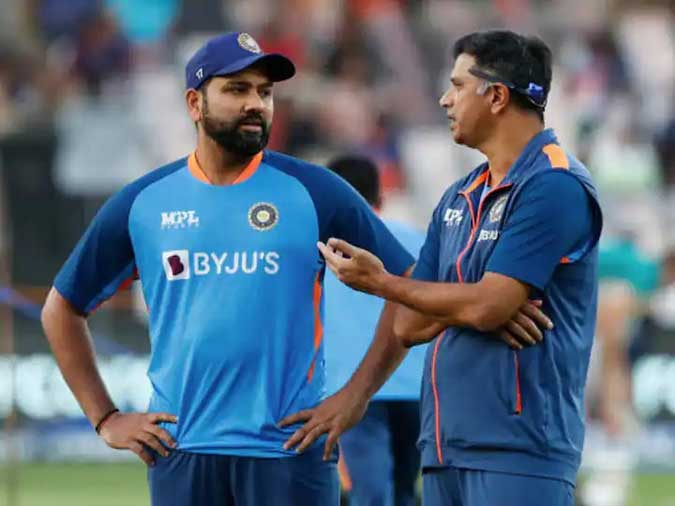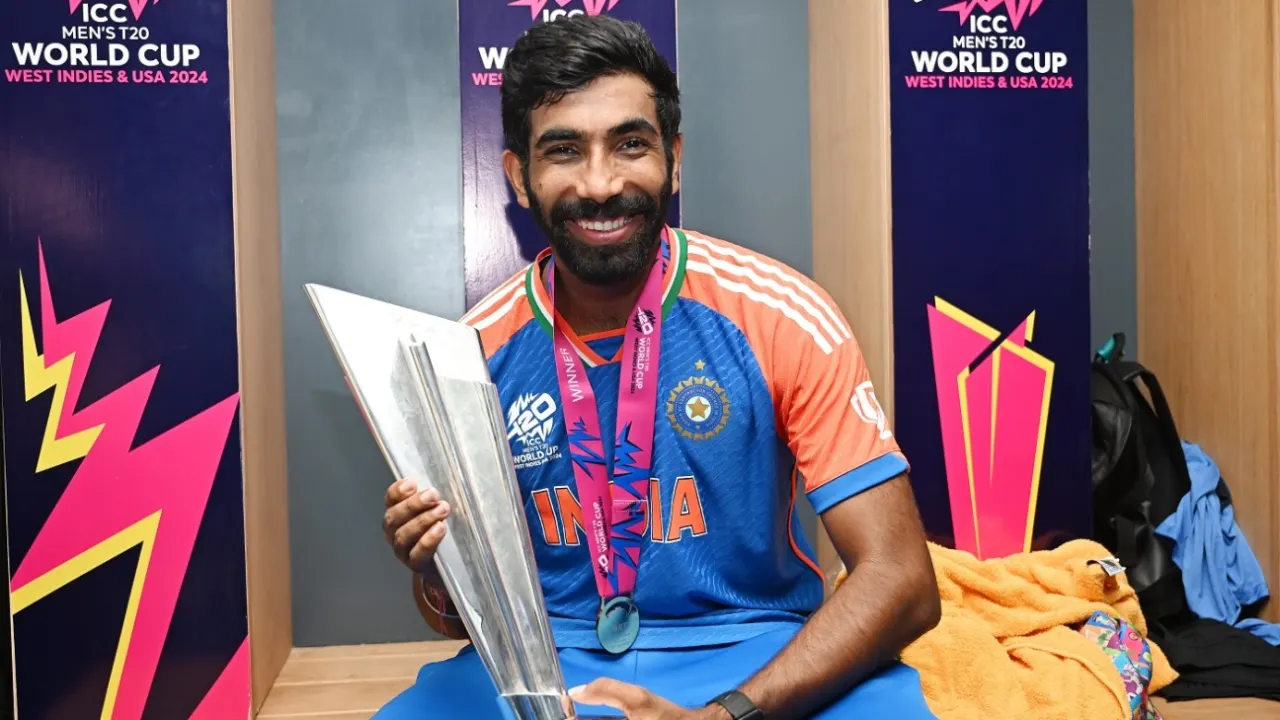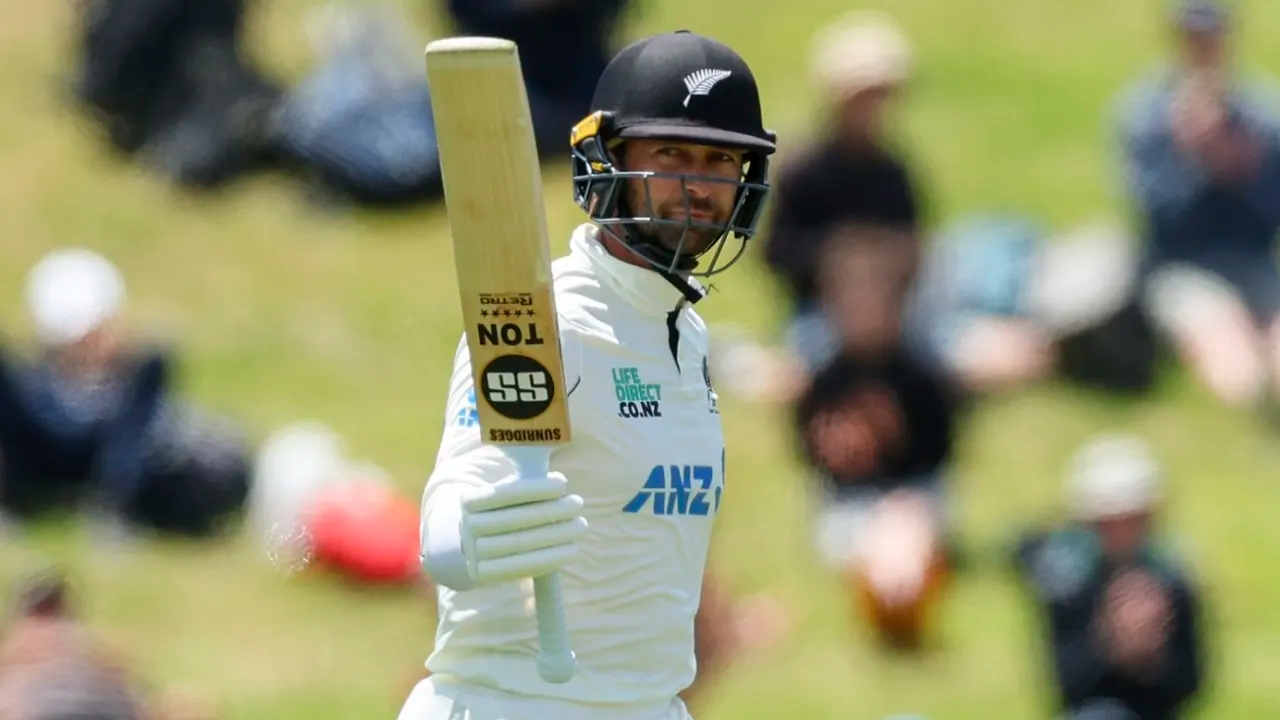Sports
Rohit Sharma’s Test captaincy faces its first huge test

It’s been a little over a year since it officially began, but has the Rohit Sharma era as India captain really begun at all?
It’s made a spluttering sort of start in Test cricket: Rohit missed three of India’s five Tests since he became their all-format captain. Injuries, in fact, have forced Rohit to miss eight of India’s last 10 Test matches. He was Player of the Match in India’s last Test before this stretch of games, a landmark victory that took them to a 2-1 series lead in England, months after they had beaten Australia 2-1 in Australia.
Since then, India’s world-beating aura has faded somewhat – they lost Tests they could have won in Johannesburg, Cape Town and Birmingham, and won one they could quite conceivably have lost in Dhaka – and Rohit has mostly been an absent figurehead.
He has had more of a chance to make an impact as a white-ball captain, and his overall results have been fantastic. Rohit has the best win-loss ratio of any India ODI captain who has led at least 10 times in that format, and only Hardik Pandya, who has only captained in 11 matches, sits above him on the corresponding T20I list.
Reaching the semi-finals of the 2022 T20 World Cup a year after exiting the same tournament at the group stage could be seen as a significant achievement for both Rohit and Rahul Dravid, who took over as head coach after the 2021 tournament. But it wouldn’t be lost on either of them that, for all the gains India made as a T20I side between the two tournaments, particularly in terms of batting approach, the same failings cost them in both 2021 and 2022.
Dravid knows from experience that tournament results end up defining captains, and that one bad tournament can cancel out the goodwill earned via bilateral results, especially in white-ball cricket. He could be remembered as the captain who turned India into a world-class chasing team in ODIs, but it’s likely that far more remember him for leading India to a group-stage exit at the 2007 World Cup.
Process dominates cricket discourse far more in Rohit’s era than it did in Dravid’s, but results – specifically results in “big” games and tournaments – eventually come to define the tenures of captains, coaches and selectors.
That Rohit succeeded Virat Kohli was itself, in part, down to a sense that he would be a big-tournament captain, and India had been starved of big-tournament titles since 2013. At the time he took over the white-ball teams, Rohit had just won his fifth IPL title as Mumbai Indians’ captain, and there were three ICC trophies up for grabs in the next two years.
Tournament results are, of course, heavily dependent on how good a team is relative to the competition, the format – one or two bad days are enough to send a strong contender out of the T20 World Cup at the group stage than they are to prevent one from reaching the IPL playoffs – and luck.
When teams win, though, the complicated story of their success is often simplified, and retold with the captain cast as some sort of all-knowing, benevolent mastermind. In the media, this premise is usually backed up with player testimonials – it’s a fresh surprise each time players in winning teams say good things about their captains, no doubt – rather than any analysis of how this superhero captain’s decision-making differed from that of other captains in similar situations, and no one ever asks whether the same team, filled with so many other winning ingredients, could have just as easily won with a different captain.
For whatever it was worth, then, Rohit came to the India captaincy with something of an aura. Now, just over a year since becoming all-format captain, there are threats to his leadership in every format.In T20Is, the threat has a name. Hardik has captained India in every T20I they’ve played since the World Cup semi-final against England in November. Rohit scored a scratchy 27 off 28 balls in that match, and he hasn’t played a T20I since. Now this is mostly because India are building up to an ODI World Cup and are looking to rest their senior players from T20Is, but it’s not inconceivable that one or more of the young top-order contenders who are now getting their chance could make themselves exceedingly difficult to leave out by the time T20Is become top priority again.
The future of Rohit’s ODI captaincy, meanwhile, could hinge on whether or not India translate their status as favourites for this year’s home World Cup into actually winning it. It’s an unfair amount of pressure, but it is what it is.
His Test captaincy, of course, has barely begun at all.
It’s against this backdrop that Rohit will lead India in one of Test cricket’s highest-profile contests. The 2016-17 Border-Gavaskar Trophy was perhaps the greatest Test series India has hosted this millennium – yes, arguably even greater than 2000-01 for the range of quality performances from both sets of players – a series where Australia made them reach into their deepest reserves of skill and stamina to complete a 2-1 comeback win.
The Australia of 2022-23 could be an even better collection of players than the one that toured in 2016-17, and could be an even better team if they address one key structural issue – the seeming lack of a quality second spinner.
India will, as ever, begin the series with a formidable spin attack and, despite the absence of Jasprit Bumrah, a group of quicks who are often deadly in home conditions. The batting will give them a few more headaches: India will be without Rishabh Pant’s genius and – for the first Test at least – Shreyas Iyer’s counterattacking flair against spin. This is a worry because they’ve been India’s best batters in subcontinental conditions since the start of 2021, a period in which Cheteshwar Pujara has averaged 34.61 in Asia and Virat Kohli 23.85. Rohit’s red-ball rhythm, meanwhile, is a bit of an unknown, since he hasn’t played a Test match since March 2022.
For all that, India should still be favourites, but if you’re an India fan and your normal pre-series anticipation is tinged with a sense of nameless dread, it could be because of this: R Ashwin is 36; Rohit, Pujara and Umesh Yadav are 35; Kohli and Ravindra Jadeja are 34; and Mohammed Shami is 32. Ishant Sharma and Ajinkya Rahane, both 34, may already have played their last Tests.
It’s fallen upon Rohit to captain India’s most successful generation of Test cricketers when they’re ageing at the same time. Managing this transition could be an exceedingly tricky task, and quite a lot of it – what can a mere captain do, for instance, to unearth successors to all-time greats? – is beyond his control, but it’s one other thing he’ll be judged on, for better or worse.
The Rohit Sharma era, then, could be a short one. And if this series against Australia – upon whose outcome hinges India’s qualification for the World Test Championship final – doesn’t go to plan, it could threaten to end before it’s even had a chance to properly begin.
(cricinfo)
Latest News
Ticket sales announced for 2026 T20 World Cup

Tickets for the 2026 T20 World Cup will go on sale at 18.45 IST and Sri Lanka time (13.15 GMT) on December 11, with the tournament slated to begin on February 7 in India and Sri Lanka.
Prices for phase one of the ticket sales start at INR 100 (USD 1.1) at some venues in India and LRK 1000 (USD 3.2), the ICC said on Thursday. The dates for phase two of the ticket sales will be announced soon. Tickets can be purchased at tickets.cricketworldcup.com.
“Phase I of ticket sales is an important milestone in our journey towards delivering the most accessible and global ICC event ever staged,” ICC CEO Sanjog Gupta said. “Our vision for the ICC Men’s T20 World Cup 2026 is clear: every fan, regardless of background, geography or financial means, should have the chance to access an in-stadia experience of world-class marquee cricket.
“With tickets starting from just INR 100 and LKR1000, we are putting affordability at the centre of our strategy. This is about opening the gates wide and inviting millions to be part of a global celebration of cricket, not as spectators from afar, but as active participants in the energy, emotion and magic that only a stadium can offer.”
The 2026 T20 World Cup will be contested by 20 teams and comprises 55 matches. The games start at 11am (0530 GMT), 3pm (0930 GMT) and 7pm IST (1330 GMT). The format for the tournament is the same as the previous edition in 2024, where the teams were divided into five groups of four each.
The first-round groups are as follows:
Group A: India, Pakistan, USA, Netherlands, Namibia
Group B: Sri Lanka, Australia, Ireland, Zimbabwe, Oman
Group C: England, West Indies, Bangladesh, Nepal, Italy
Group D: New Zealand, South Africa, Afghanistan, Canada, UAE
The top two teams from each of the groups progress to a Super Eight phase, where they will be further divided into two groups of four each.
The Super Eight groups are as follows, assuming these teams qualify from the first round; if another team qualifies, they will take the place of the team from their group that failed to make it:
Super Eight Group 1: X1 (India), X2 (Australia), X3 (West Indies), X4 (South Africa)
Super Eight Group 2: Y1 (England), Y2 (New Zealand), Y3 (Pakistan), Y4 (Sri Lanka)
Each team will play the other three in their Super Eight group, with the top two from each group qualifying for the semi-finals. The two semi-finals are in Kolkata – or Colombo if Pakistan qualify – on March 4, and Mumbai on March 5. The final of the tournament will be played in Ahmedabad on March 8 – if Pakistan qualify, it will be held in Colombo.
[Cricinfo]
Latest News
Fifties from Conway, Hay extend New Zealand’s advantage

Despite a bright bowling performance from the West Indies seamers, half-centuries from New Zealand’s Devon Conway and Mitchell hay extended the hosts’ advantage after an absorbing second day of the Wellington Test. New Zealand secured a 73-run first-innings lead before a double-wicket burst from their quicks left West Indies still 41 behind with eight wickets in hand.
West Indies produced bursts of quality with the ball to keep pegging New Zealand back, and several home batters contributed to their own dismissals with loose shots. But the visitors also offered enough scoring opportunities for Conway and Hay to make valuable inroads.
Conway’s 60 – his first fifty against West Indies and 13th overall – anchored one end, while debutant Hay struck an enterprising 61 from No. 6. Their efforts allowed New Zealand to declare at 278 for 9, with the injured Blair Tickner not batting.
With the relatively new ball, Kemar Roach, Jayden Seales, Ojay Shields and Anderson Phillip consistently challenged the batters as the ball swung both ways and occasionally jagged off the surface. Conway, however, punished the loose deliveries, hitting eight fours – mostly cuts and flicks – to keep New Zealand moving.
From the non-striker’s end, he saw Tom Latham (11) lose his off stump to a nip-backer from Roach from around the wicket, before watching Kane Williamson (37) have his off stump pegged back by an Anderson Phillip delivery that squared him up. After lunch, Rachin Ravindra – who made 176 in Christchurch – was caught behind off Roach while chasing a wide one. Conway himself was then caught down the leg side off a poor Justin Greaves delivery, thanks to a superb diving take from Tevin Imlach. At that stage, New Zealand seemed to be wobbling at 117 for 4.
A fifth-wicket stand of 73 between Daryl Mitchell (25) and Hay – the latter playing in place of the injured Tom Blundell – brought New Zealand closer to West Indies’ first-innings score of 205. Mitchell was conservative, while Hay leaned on his white-ball instincts to score his runs, producing strong cuts through the off side and, when tested with short balls, pulling confidently over the leg side.
Mitchell, like Conway, was eventually strangled down the leg side off Phillip. Hay later fell to the short-ball tactic: after striking back-to-back fours behind square leg, he miscued a pull off Shields straight to Roach at deep-backward square and walked back bitterly disappointed. At 213 for 6, New Zealand then leaned on Glenn Phillips (18) and the lower order to extend their lead.
West Indies continued to pepper Phillips with short balls in a cat-and-mouse exchange that brought body blows and top-edges over the keeper. Seeking a change, captain Roston Chase turned to spin for the first time in the innings, and needed only four deliveries to tempt Phillips into a slog that failed to clear deep midwicket.
Zak Foulkes then batted 43 balls and frustrated West Indies with deflections off the seamers’ through the gully region on his way to an unbeaten 23. Jacob Duffy added further runs with boundaries to long-off and long-on, and No. 10 Michael Rae joined a rare group of batters to begin their Test careers with five runs off an overthrow boundary. Rae reached 13 before the expensive Seales finally claimed his first wicket of the match, knocking back the debutant’s leg stump.
New Zealand’s batting may have been patchy, but their bowlers restored control with a sharp ten-over burst late in the day. John Campbell fell in the seventh over, beaten by a Rae delivery that zipped in to hit off stump. Next over, nightwatcher Phillip initially survived a DRS review for caught behind off Duffy, but a second look confirmed he was lbw instead. Brandon King (15*) and Kavem Hodge (3*) saw out the final few minutes, but West Indies still face a steep challenge when play resumes on Friday.
Brief scores:
West Indies 205 and 32 for 2 (Brandon King 15*; Michael Rae 1-4, Jacob Duffy 1-8) trail New Zealand 278 for 9 dec (Mitchell Hay 61, Devon Conway 60; Andeson Phillip 3-70) by 41 runs
[Cricinfo]
Latest News
Olympics decision on gender eligibility to come in early 2026

The International Olympic Committee says it will announce eligibility criteria for transgender athletes early next year, after months of deliberation as it seeks to find a consensus on how to protect the female category.
The issue has been a source of controversy, with no universal rule in place for the participation of transgender athletes at the Olympic Games.
The IOC, under its new President Kirsty Coventry, did a U-turn in June, deciding to take the lead in setting eligibility criteria for Olympic participation, having previously handed responsibility to the individual sports federations, leading to a confusing patchwork of different approaches.
In September, Coventry set up the “Protection of the Female Category” working group, made up of experts as well as representatives of international federations, to look into how best to protect the female category in sports.
“We will find ways to find a consensus that has all aspects covered,” Coventry told a press conference on Wednesday following an IOC executive board meeting. “Maybe it is not the easiest thing to do, but we will try our best, so when we talk about the female category, we are protecting the female category.”
Coventry said a decision would come in the first months of 2026.
“We want to make sure we have spoken to all stakeholders, taken adequate time to cross the Ts and dot the Is,” she said.
“The group is working extremely well. I don’t want to try to constrain the working group by saying they need to have a specific deadline, but I am hopeful in the next couple of months and definitely within the first quarter of next year we will have a clear decision and way forward, which I think we are all looking forward to,” said Coventry, a former Olympic swimming champion.
Before Coventry’s decision in June, the IOC had long refused to apply any universal rule on transgender participation for the Games, instructing international federations in 2021 to come up with their own guidelines. Under current rules, still in force, transgender athletes are eligible to take part in the Olympics.
Only a handful of openly transgender athletes have taken part in the Games. New Zealand’s Laurel Hubbard became the first openly transgender athlete to compete in a different gender category to that assigned at birth when the weightlifter took part in the Tokyo Olympics in 2021.
Currently, some international federations have rules in place, but others have not yet reached that stage.
US President Donald Trump has banned transgender athletes from competing in sports in schools in the United States, which civil society groups say infringes on the rights of trans people, as Los Angeles prepares to host the 2028 Summer Olympics.
Trump, who signed the “Keeping Men Out of Women’s Sports” order in February, has said he would not allow transgender athletes to compete at the LA Games.
[Aljazeera]
-

 News4 days ago
News4 days agoOver 35,000 drug offenders nabbed in 36 days
-

 Features2 days ago
Features2 days agoFinally, Mahinda Yapa sets the record straight
-

 News3 days ago
News3 days agoCyclone Ditwah leaves Sri Lanka’s biodiversity in ruins: Top scientist warns of unseen ecological disaster
-

 Business6 days ago
Business6 days agoLOLC Finance Factoring powers business growth
-

 News6 days ago
News6 days agoCPC delegation meets JVP for talks on disaster response
-

 News6 days ago
News6 days agoA 6th Year Accolade: The Eternal Opulence of My Fair Lady
-

 News4 days ago
News4 days agoRising water level in Malwathu Oya triggers alert in Thanthirimale
-

 Features5 days ago
Features5 days agoThe Catastrophic Impact of Tropical Cyclone Ditwah on Sri Lanka:













